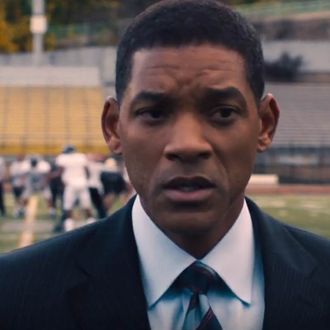
Those affiliated with Sony’s Will Smith–starring Concussion went to meticulous lengths to avoid angering the NFL throughout the football-centric film’s production and marketing run-up, according to a report from the New York Times. The movie, directed by Peter Landesman, is based on the true story of Dr. Bennet Omalu, the Nigerian forensic pathologist who first identified chronic traumatic encephalopathy in professional football players. The movie hopes to be true and fair to Omalu’s life — as well as that of the league’s.
In a comprehensive review of dozens of past emails from last year’s Sony hack, the Times discovered that Smith was to be positioned as a supporter of the sport; the film was to be marketed as a whistle-blower story (more about the man, less about the sport and its dangers), unflattering details involving the league were to be cut, and the long-term effects of the game were to look less threatening, among other conservative strategies. All of this to reportedly appease the NFL. The initial idea behind the movie, like Omalu’s pioneering work, was viewed as contentious because it shed light on ugly questions the league has been dealing with for the last decade or so: Is CTE, because of participation in the sport, leading to death? And is the sport, therefore, a long-term threat to its players?
Here’s a sampling of what the emails said, regarding:
Positioning the movie
“Will is not anti football (nor is the movie) and isn’t planning to be a spokesman for what football should be or shouldn’t be but rather is an actor taking on an exciting challenge … We’ll develop messaging with the help of N.F.L. consultant to ensure that we are telling a dramatic story and not kicking the hornet’s nest.”
The NFL
“[A] top Sony lawyer is said to have taken ‘most of the bite’ out of the film ‘for legal reasons with the N.F.L. and that it was not a balance issue.’”
“Another email … said some ‘unflattering moments for the N.F.L. were deleted or changed.’”
“Rather than portray the N.F.L. as one corrupt organization can we identify the individuals within the N.F.L. who were guilty of denying/covering up the truth.”
A handful of emails (notably from ex-exec Amy Pascal, who said she was committed and passionate about making such an important and controversial film), hint that the filmmakers were striving for truth and fairness, not kowtowing to the NFL. “We’re just being smart because any large corporation will design a response to something it considers to be a threat to its existence,” Landesman said, noting they even scrapped a meeting with the NFL about the film and refused to let top officials see the script. “There was never an instance where we compromised the storytelling to protect ourselves from the N.F.L.,” he added. The trailer certainly seems fair:
The NFL itself had nothing to say to the Times about the hacked emails, but did say:
“We are encouraged by the ongoing focus on the critical issue of player health and safety … We have no higher priority. We all know more about this issue than we did 10 or 20 years ago. As we continue to learn more, we apply those learnings to make our game and players safer.”
To see more of the emails, you can read the full Times report here. You can see how the film turned out on Christmas.

